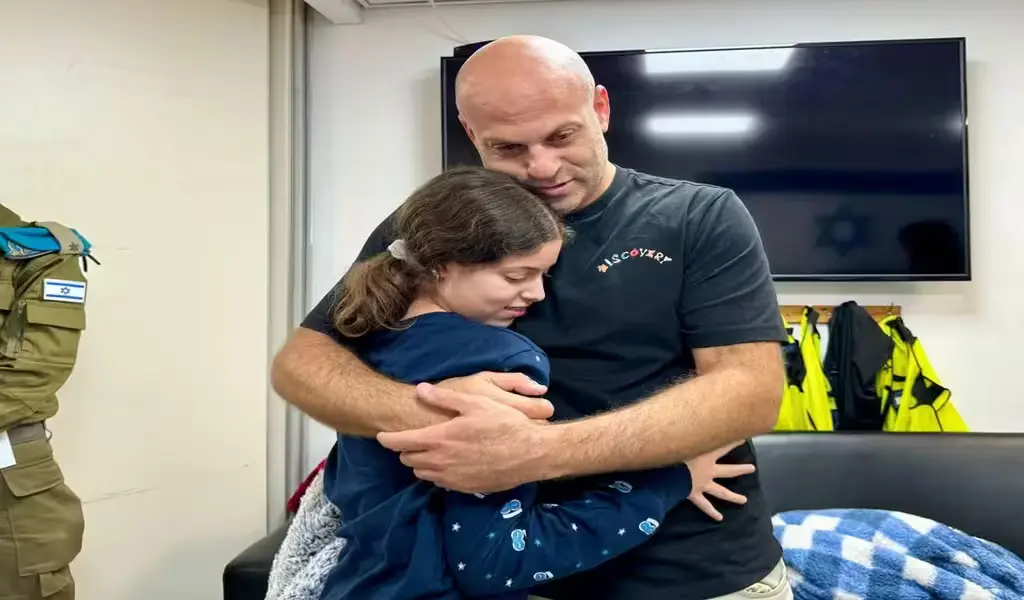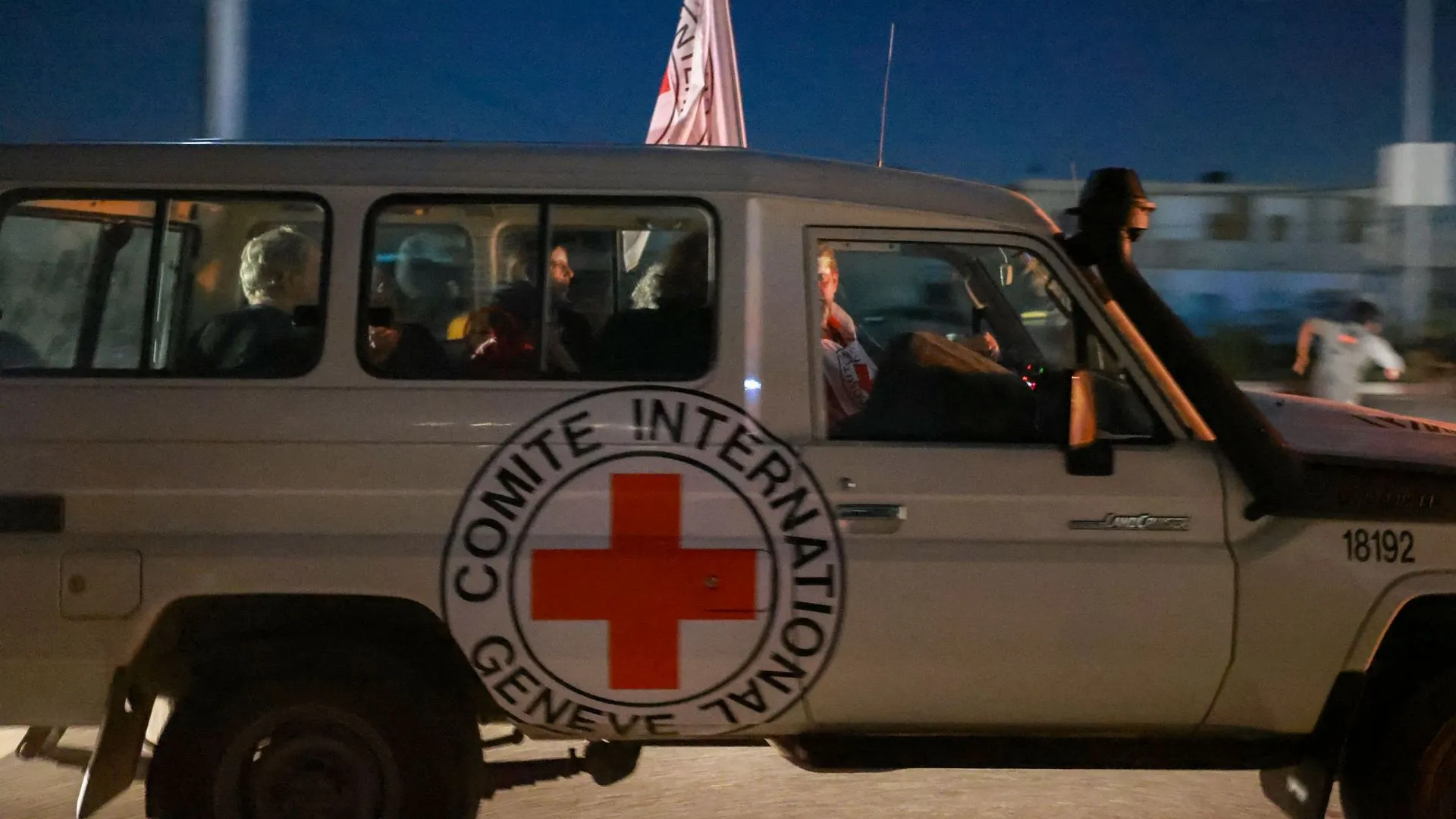(CTN News) – The second wave of hostages released from Hamas captivity in return for Palestinian captives reached Israel on Sunday, with thirteen Israelis and four Thai nationals among them. A disagreement over assistance distribution into Gaza had threatened to derail the accord for a moment.
The agreement to exchange 50 hostages held by the Palestinian militant group for 150 detainees in Israeli jails was fragile, but it was eventually surmounted through mediation by Egypt and Qatar. The debate that endangered the truce to free captives highlighted the pact’s weakness.
After escaping Gaza, hostages were shown on television on the Egyptian side of the Rafah border crossing as Hamas turned over the prisoners to the Red Cross late on Saturday.
Among the thirteen Israelis sent free, six were female, and seven were either minors or teens. The youngest was Yahel Shoham, who was three years old, and she and her brother were all released, but her father was still a hostage.
“The released hostages are on their way to hospitals in Israel, where they will re-unite with their families,” the Israel Defense Forces (IDF) announced formally.
According to the Palestinian news agency WAFA, Israel has freed 39 Palestinians from two prisons, including 33 children and 6 females.
According to a witness who spoke with Reuters, a portion of the Palestinians made it to Al-Bireh Municipality Square in Ramallah, which is located in the West Bank under Israeli occupation. There, thousands of civilians were waiting for them.
According to a Palestinian official informed of the diplomatic developments, Hamas would uphold the ceasefire, which was the initial ceasefire since the group’s militants stormed southern Israel on October 7th, murdering 1,200 and abducting approximately 240.
In retaliation for that attack, Israel has threatened to crush the Hamas terrorists in control of Gaza by conducting a ground offensive in the northern part of the territory and bombarding it with bombs and shells. According to Palestinian health authorities, 14,800 individuals have been dead, with around 40% being minors. This information was announced on Saturday.
After 13 Israeli hostages, including children and the elderly, were released by Hamas the day before in exchange for the release of 39 Palestinian women and minors from Israeli prisons, the transfer on Saturday followed suit.
Additionally, ten Thai agricultural laborers and a Philippine national were released by Hamas on Friday.
The four Thai nationals who were released on Saturday “want a shower and to contact their relatives,” according to Prime Minister Srettha Thavisin’s statement on social media platform X. Thavisin said that all four were safe and had few negative side effects.
The foreign ministry of Thailand announced on Sunday that eighteen Thais are still held captive. This figure takes into account two abductions that were previously unknown.
Thongkoon Onkaew expressed her immense joy and relief to Reuters over the phone upon the release of her son Natthaporn, 26, who was the only breadwinner in the family.
With Saturday’s announcement that Hamas’ armed wing would suspend releases unless Israel fulfilled all truce conditions—including a commitment to allow relief trucks into northern Gaza—the arrangement seemed certain to fall through.
After a day of intense negotiation facilitated by Egypt and Qatar, the deal was salvaged. U.S. President Joe Biden was involved in this process, phoning Qatari Emir Sheikh Tamim bin Hamad Al Thani.
According to Osama Hamdan, a spokeswoman for Hamas, “less than half of what Israel agreed on” (65 out of 340 supply trucks that entered Gaza since Friday) had made it to northern Gaza.
The armed branch of Hamas, Al-Qassam Brigades, also claimed that Israel had disregarded the conditions for the release of Palestinian detainees that took their length of captivity into account.
Within the Gaza Strip, aid is distributed by the United Nations and international organizations, according to the Israeli Defense Forces. It was seven weeks ago that the war broke out, but on Saturday, 61 trucks brought aid to northern Gaza, according to the United Nations. Food, water, and emergency medical supplies were among them.
A spokeswoman for the Qatari foreign ministry, Majed Al-Ansari, stated that there had been “a lot of discussion” over the criteria for prioritizing release, with the duration of incarceration in Israeli prisons being a crucial factor for the Palestinian team.
“We are now hopeful that, with the second or the third day of this pause, we would be able to hash out a lot of these details,” CNN reported.
Israel has indicated that the ceasefire could be prolonged if Hamas maintained a daily release rate of ten hostages or more. Up to one hundred hostages may be set free, according to a Palestinian source.
For hours on Saturday, relatives of hostages waited impatiently, some of whose elation was dampened by the fact that others remained in captivity.
“My heart is split because my son, Itay, is still in Hamas’ captivity in Gaza,” stated Mirit Regev, who is the mother of Maya Regev—a family member who was released late on Saturday—in a statement from the Hostage and Missing Families Forum, which represents the families.
Aviv Havron, a relative, claimed that the family’s anxious wait for the release of the Shohams—who abducted a parent in Gaza—had been excruciating. According to what he said, “But what is that compared to the 50 days they spent as hostages?” he said, quotes Ynet.
Along with Hila Rotem, whose mother is still held captive, and hostage Emily Hand, an Irish-Israeli girl of nine years old, who was believed to have been killed at the outset but who was really held captive until her ninth birthday before being released.
In a statement, Hand’s family expressed their excitement at reuniting with Emily, while also paying tribute to Raya Rotem and the other captives who have not yet been released.
There was a hint of resentment in the Palestinians’ pleasure at the release.
As one of them, Shorouk Dwayyat, who had completed half of her sixteen-year term, told Al Jazeera TV, “I feel like I am in a dream, but I hope that the war on Gaza will stop as soon as possible,” she was talking about the conflict in Gaza.








